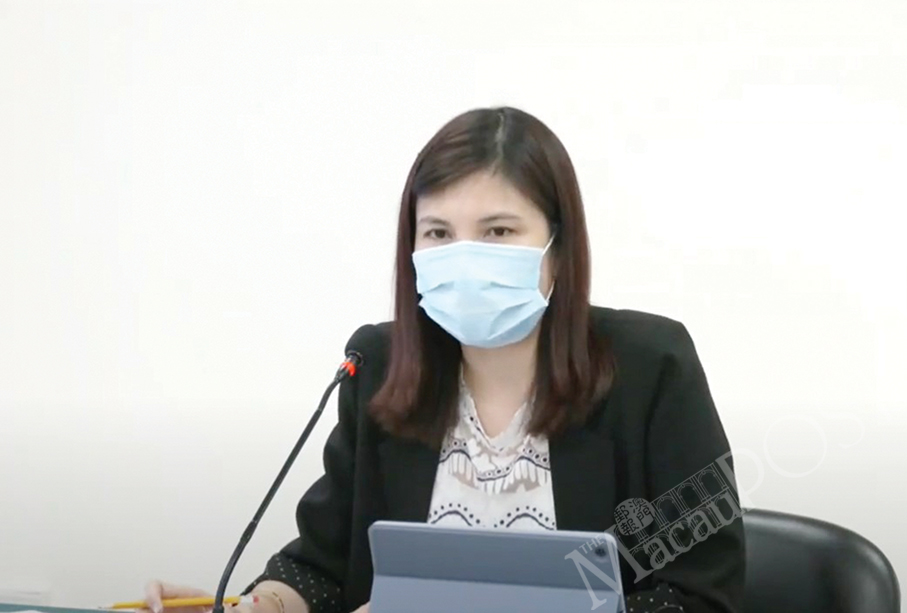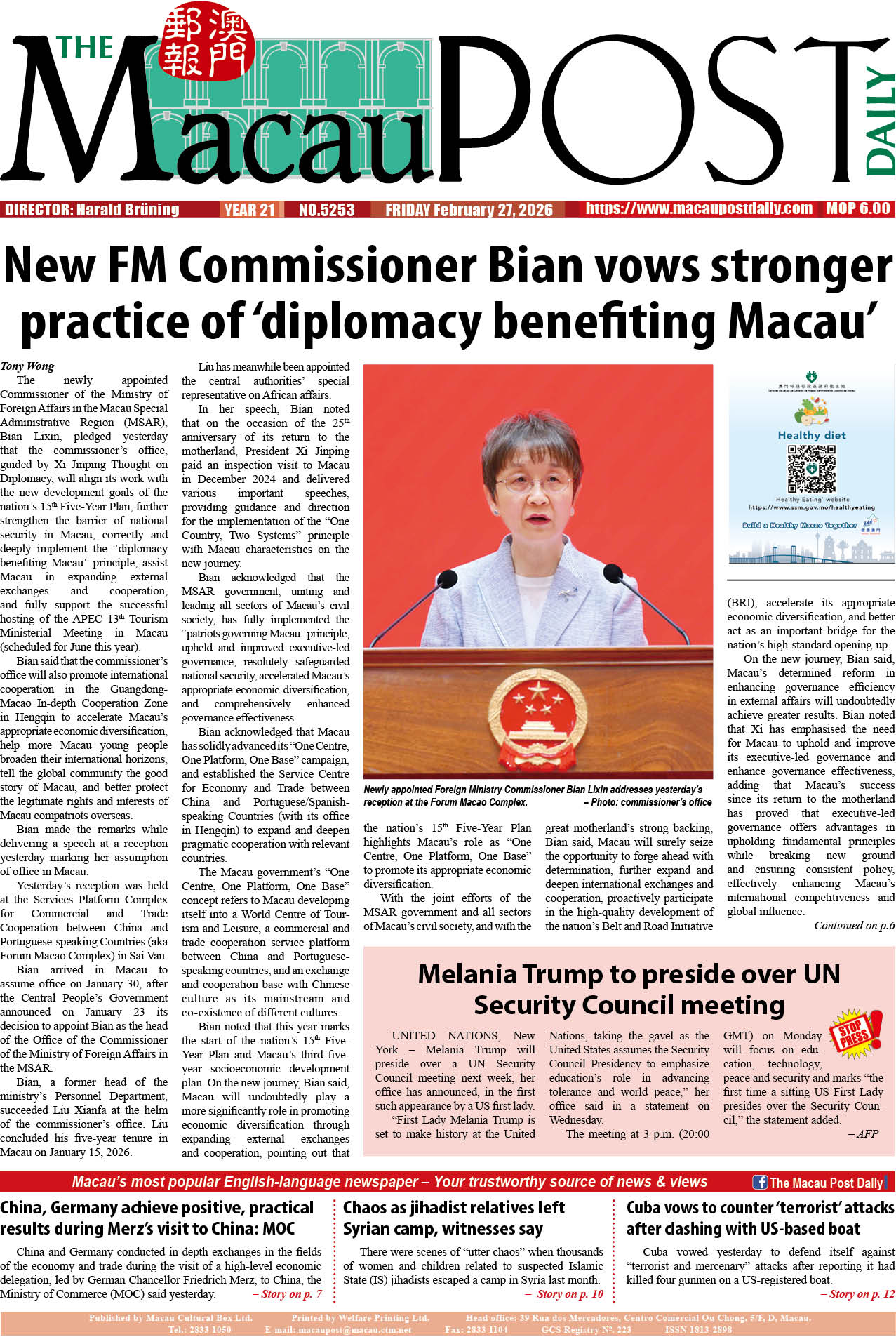The fee for a COVID-19 nucleic acid test (NAT) at the city’s regular testing stations has been further reduced to 45 patacas, the government announced yesterday.
The new NAT fee took effect yesterday, a five-pataca reduction from the previous 50 patacas, which had been in force since early last month.
The five-pataca NAT fee reduction was announced by Wong Weng Man, acting chief of the Health Promotion Division of the Health Bureau (SSM), during yesterday’s weekly press conference by the Novel Coronavirus Response and Coordination Centre.
Since the launch of Macau’s paid NAT programme in May 2020 when each test cost 180 patacas, the testing fee has gradually been decreasing. Since then, the programme has seen fee reductions many times, namely 120 patacas in August 2020, 100 patacas in November 2020, 90 patacas in March last year, 80 patacas in June last year, 70 patacas in October last year, 55 patacas in June this year, and 50 patacas early last month.
Currently, the city has around four dozen NAT sampling stations offering paid tests run by five testing institutions, many of which are outdoor stations.
The about four dozen NAT sampling stations in the community do not include the about 10 NAT sampling stations in casino-hotel resorts that also offer paid tests.
Before Macau’s latest COVID-19 outbreak that began on June 18, the city only had seven community NAT stations run by four testing institutions, namely Kuok Kim (Macau) Hygiene Examination Company Limited, Guangdong Nam Yue Group, the private Kiang Wu Hospital, and the private Macau University of Science and Technology’s (MUST) University Hospital.
The recent COVID-19 outbreak, Macau’s worst since the start of the pandemic nearly three years ago, is also known in Chinese as “618 outbreak”, which started to subside around six weeks ago. “618” refers to the fact that the outbreak started on June 18.
A new testing institution, a joint venture between China Travel Service (CTS) Macau and Pureza Medical and Health Technology, joined Macau’s nucleic acid testing services when the city was hard hit by the 618 outbreak, which lasted around six weeks during which Macau had a large demand for mandatory nucleic acid testing.
Since Macau returned to its normalised COVID-19 prevention and control period on August 8, many of the NAT sampling stations that were operated by the new testing institution during the 618 outbreak have been continuing to operate offering paid tests.
According to the Health Bureau’s booking system on the city’s paid community NAT programme, 10 out of the about four dozen NAT sampling stations are currently run by the original four testing institutions, while the remainder are run by the CTS-Pureza joint venture.
Many of the CTS-Pureza NAT sampling stations are outdoor stations.
Paid COVID-19 nucleic acid tests carried out in casino-hotel resorts are booked through another Health Bureau booking system that is earmarked for “visitors”, but in reality other people such as local residents can also book a test on this system.
The new NAT fee of 45 patacas is also applicable to tests carried out at stations in casino-hotel resorts.
During yesterday’s press conference, Wong reaffirmed that the Health Bureau will continue asking the city’s testing institutions to further reduce their NAT fees.
While the NAT fee in Macau is higher than in the mainland, it is significantly lower than in Hong Kong where each test costs up to 240 patacas, varying among different private testing institutions.
Why nationals from 41 foreign countries first
Meanwhile, Wong also underlined that the Macau government will continue to further relax its COVID-19 entry restrictions for more groups and categories of non-resident foreigners (i.e., foreign nationals without a Macau ID card) in phases in the near future.
Since yesterday, nationals from 41 foreign countries have been allowed to enter Macau directly from the Chinese regions of Hong Kong and Taiwan as well as from all foreign countries and regions without having to apply to the Macau Health Bureau in advance.
The 41 countries comprise Australia, Austria, Belgium, Brazil, Brunei, Canada, the Czech Republic, Denmark, Estonia, Finland, France, Germany, Greece, Hungary, Iceland, Ireland, Israel, Italy, Japan, Latvia, Liechtenstein, Lithuania, Luxembourg, Malaysia, Malta, Netherlands, New Zealand, Norway, Poland, Portugal, Romania, Singapore, Slovakia, Slovenia, South Korea, Spain, Sweden, Switzerland, Thailand, the United Kingdom, and the United States.
Wong also said yesterday that Macau’s tourism industry and economy have been hard hit by the COVID-19 pandemic for over two years, which has also resulted in a significant increase in the city’s unemployment rate.
Wong said that the Macau government is aware that the COVID-19 situation in many countries in the world has meanwhile relatively eased. After striking the right balance between COVID-19 prevention and Macau’s need to have a continuous economic recovery, Wong said, the Macau government has been planning to lift its entry ban on non-residents foreigners from more countries and regions step by step in the near future.
Consequently, Wong said, the Macau government decided to first allow nationals from the 41 foreign countries, which are more advanced economies, to enter Macau directly from Hong Kong, Taiwan and foreign countries without having to apply for entry beforehand.
In addition, Wong also noted that currently Macau is running regular passenger flights with only one foreign country, Singapore. Wong noted that passport holders of the 41 foreign countries are allowed to stay in Hong Kong for a relatively longer period of time compared to those from other foreign countries, because of which it will be more convenient for nationals from the 41 foreign countries to leave Macau via Hong Kong, she said.
Reporters asked during yesterday’s press conference why the Macau government’s entry permission for non-resident foreigners without the need to apply does not include countries where many of Macau’s foreign non-resident workers (NRWs) come from, such as Indonesia, Nepal, the Philippines and Vietnam. Wong replied that the Macau Health Bureau has rolled out measures that allow foreign NRWs to apply to enter Macau from foreign countries.
Wong underlined that for the next phase the Macau government will consider allowing nationals from more countries to enter Macau directly without having to apply in advance.
Macau’s COVID-19 tally of confirmed and asymptomatic cases yesterday stood at 793 and 1,523 respectively, including six fatalities.
Macau confirmed its first novel coronavirus case in January 2020.

Wong Weng Man, acting chief of the Health Bureau’s (SSM) Health Promotion Division, addresses yesterday’s press conference about the city’s COVID-19 situation. – Photo: GCS






